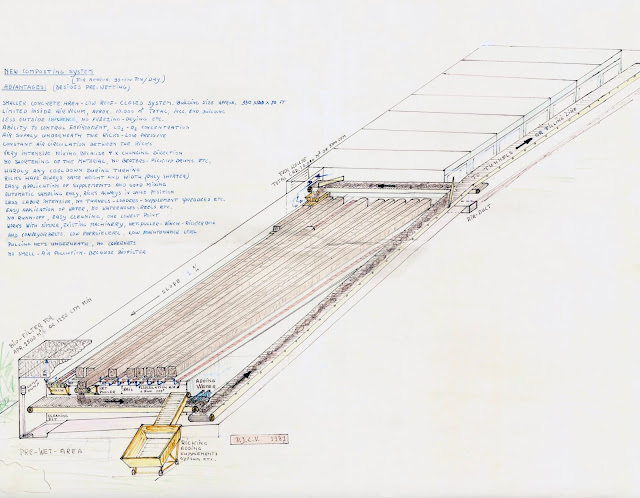Long before Internet or Social Media, in 1987, Pieter made this design
NEW COMPOSTING SYSTEM
(For approximately 90-100 tons/day)
ADVANTAGES: (Besides Pre-Wetting)
Smaller concrete area - low roof - closed system. Building size approximately 330 x 100 x 10 feet
Limited inside air volume, approximately 10,000 m³ total, including end building.
Less outside influence, no freezing - drying etc.
Ability to control environment, CO₂ O₂ concentration.
Air supply underneath the ricks - low pressure.
Constant air circulation between the ricks.
Very intensive mixing, because 4 x changing direction.
No shortening of the material, no beaters - pick-up drums etc.
Hardly any cool down during turning.
Ricks have always same height and width (only shorter).
Easy application of supplements and good mixing.
Automatic sampling easy, ricks always in same position.
Less labour intensive, no turners - loaders - supplement spreaders etc.
Easy application of water, no water hoses - reels etc.
No run-off, easy cleaning, one lowest point.
Works with simple, existing machinery, net-puller, winch, ricker-box and conveyor belts.
Low energy level - low maintenance level.
Pulling nets underneath, no cover nets.
On the left: Fan house total capacity 10,000 m³ per Hour, or 5000 CFM (Cubic Feet per Minute)
On the right: To tunnel ⇢ or filling line
Air duct
On left: Bio filter for approximately 2500 m³ per hour or 1250 CFM (Cubic Feet per Minute)
Sump pump ← slope 1%
Winch Net Puller Rail Circulation air Adding water
Run off
Cleaning pit
Pre-wet area Ricking P.J.C. VEDDER 1987
Adding Supplements
Gypsum etc.
Husband Pieter no doubt was ahead of his time...
Sure, he always has been a brilliant thinker and the BEST teacher I've ever had.
Feeling very proud of him:
Husband Pieter's Graduation List:
EXAMS TEACHERS HORTICULTURAL TECHNIQUE B 1956
GRADEBOOK
of
P. VEDDER
Horticultural technology 8
Engines and tools 10
Physics and mechanics 8
Economy 8
Result: Graduated
Wageningen, 27 juni 1956 (wur.nl - Wageningen University & Research)
The exam board
EXAMS TEACHERS HORTICULTURAL TECHNIQUE A 1957
GRADEBOOK
of
P. J. VEDDER
Horticultural technology 8
Heating 8
Greenhouse construction 8
Storage and Electricity 8 8
Physics 8
Economy 8
Result: Graduated
Wageningen, 10 juli 1957 (wur.nl - Wageningen University & Research)
The exam board
Having already the HORTICULTURAL TRAINING A, 1956 -1957 under his belt,
husband Pieter had to perform a TEST LESSONEducational preliminary training: T.T. B = Horticultural Technique B
Place: Vegetable Growing Vocational School, Venlo/The Netherlands
Time: June 21, 1957
Subject: Control Devices
A good test lesson, which is carefully prepared and given in a pleasant manner. If the candidate gets a little more routine, he will become a very good force with his diligence and ingenuity When it comes to the use of tools, he is one of the very best.
The grading scale in the Netherlands
National training course for horticultural subject teachers.
General part, B.
Vedder P.J.C. Arcen, Limburg
Psychology, pedagogy and didactics 9
Soil science and fertilization 8
Biology 8
Dutch language 9
Board writing 7
Economy 8
In the Netherlands, the traditional grading scale is from 1 to 10, where 1 is the lowest and 10 the highest grade. The pass mark for a single subject is 6, but for school leaving examinations, where 6 or more subjects are examined, one 5 or one 4 may be condoned if compensated for by high grades in other subjects. Grades 1 to 3 are very rarely given, and the same is true for grades 9 and 10. The most common grades in both secondary and higher education are 6 and 7.
Grading in secondary and higher education differs to the extent that high grades are slightly less frequent in secondary education than in higher education. Based on data from 2006 regarding secondary school examinations, the percentages of grades were as follows:
9.50 - 10.00 Excellent
9.50 - 10.00 Excellent
8.50-9.49 Very Good
7.5-8.49 Good
6.50-7.49 Highly satisfactory
6.00-6.49 Satisfactory
5.50-5.99 Almost satisfactory
4.00-5.49 Unsatisfactory
3.00-3.99 Very unsatisfactory
2.00-2.99 Poor
1.00-1.99 Very poor
Wageningen university (in The Netherlands) ranks world's best in the field of Agriculture & Forestry
Related posts about our publication and reviews by others:
modern mushroom growing 2020 harvesting | post about our latest publication
Editorial Review by British Mushroom Journal: P.J.C. Vedder as an Eminent Mushroom Expert, and a Gifted Teacher is Greatly Valued and Admired Internationally | loving words by top magazine
The Three Most Important Items for Mushroom Production 'Compost, Compost, Compost!' | editorial written by Campbell colleague upon Pieter's resignation and departure to Italy...












